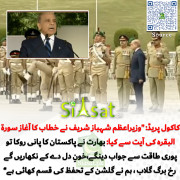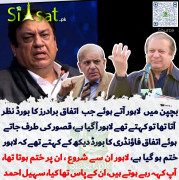Re: A renowned scholar provoking people to attack Milaad events.
Najdis read your books complete.
This is Imam Ibn Taymiyya's opinion about Mawlid from: "the Collected Fatwas," ("Majma' Fatawi Ibn Taymiyya,") Vol. 23, p. 163: "fa-t'adheem al-Mawlid wat-tikhaadhuhu mawsiman qad yaf'alahu ba'ad an-naasi wa yakunu lahu feehi ajra `adheem lihusni qasdihi t'adheemihi li-Rasulillahi, salla-Allahu `alayhi wa sallam"
"To celebrate and to honor the birth of the Prophet (s) and to take it as an honored season, as some of the people are doing, is good and in it there is a great reward, because of their good intentions in honoring the Prophet (s)."
Allama Ibn Qayyim al Jawziyyah, the best and most reknowned student of Shaikh ul-Islam Ibn Taymiyya, writes, on page 498 of "Madarij as-Salikin,"
"Listening to a good voice celebrating the birthday of the Prophet (s) or celebrating any of the holy days in our history gives peace to the heart, and gives the listener light from the Prophet (s) to his heart, and he will drink more from the Muhammadan spring (`ayn al-Muhammadiyya)."
One of the most reknowned scholars is Ibn Kathir. Ibn Kathir was a muhaddith from the followers of Shaikh ul-Islam Ibn Taymiyya, rahmatullah `alayh. Ibn Kathir, in the last days of his life wrote a book entitled "Mawlid Rasul Allah (s)" which was spread far and wide. That book mentioned the permissibility and recommendability of celebrating the Mawlid.
Ibn Kathir says in the aforementioned book, p. 19:
"The Night of the Prophet's (s) birth is a magnificent, noble, blessed and holy night, a night of bliss for the believers, pure, radiant with lights and of immeasurable price."
Shaikh ul-Islam Ibn Taymiyya Said: "Laylat al-'Israa' wal-Mi'raj is Greater than Laylat al-Qadr"
Imam Ibn Taymiyya said that Laylat al-'Israa' wal-Mi'raj was better than Laylat al-Qadr. He is quoted by Ibn Qayyim in the latter's book, "al-Badaa'i," Vol. 3, page 162: "wa suila shaikh ul-Islam `an Laylat ul-Qadri wa Laylat ul- 'Israai' ayyuhuma afdal? Fa-ajaaba bi-anna Laylat ul-'Israai' afdal fee haqq in-Nabee"
"Shaikh ul-Islam Ibn Taymiyya was asked, `Which is better, Laylat al-Qadr or Laylat al-'Israa'?' and he answered, `With respect to the Prophet (s), Laylat al-'Israa' is better than Laylat al-Qadr.'"
Now we ask: If Ibn Taymiyya accepted that Laylat al-'Israa' may be considered better than Laylat ul-Qadr, why not consider that Laylat al-Mawlid is better than Laylat al-'Israa', since the Night of the Prophet's (s) Birth is the night in which was born the one who went to `Isra' and Mi'raaj? Therefore we say, as Ibn Marzuq, the reknowned student of Imam Nawawi said: "Laylat al-Mawlid is better than Laylat al-Qadr."
In the time of the Prophet (s), it is well-known that poets came to him with all kinds of works praising him, writing about his campaigns and battles and about the Sahaba. This is proved by the numerous poems quoted in the Siras of Ibn Hisham, al-Waqidi, and others. The Prophet (s) was happy with good poetry. It is reported in Bukhari's "al-Adab al-Mufrad" that he said: "There is wisdom in poetry."
Ibn Kathir says in his "Mawlid," page 30: "The Prophet's (s) uncle al-'Abbas (r) composed poetry praising the birth of the Prophet (s), in which are found the following lines: `When you were born, the earth was shining, and the firmament barely contained your light, and we can pierce through, thanks to that radiance and light and path of guidance.'"
Ibn Kathir mentions the fact that according to the Sahaba, the Prophet (s) praised his own name and recited poetry about himself in the middle of the battle of Hunayn in order to encourage the Companions and frighten the enemies. That day he said (s): "Ana an-Nabee, laa kadhib Ana ibn `abd al-Muttalib" meaning: "I am the Prophet! This is no lie. I am the son of `Abd al-Muttalib!"
`Allama Ibn Qayyim al-Jawziyya wrote in his book "Madarij as- Salikin," Vol. 1:
"the Prophet (s) also gave permission to sing in wedding celebrations, and allowed poetry to be recited to him. He heard Anas (r) and the Companions praising him and reciting poems while digging before the famous battle of the Trench (Khandaq) as they said: "We are the ones who gave bay'ah to Muhammad for jihad as long as we are living."
Ibn Qayyim also mentions `Abdullah ibn Rawaha's long poem praising the Prophet (s) as the latter entered Mecca, after which, the Prophet (s) prayed for him. He prayed that Allah support Hassan, another poet, with the Holy Spirit as long as he would support the Prophet (s) with his poetry. Similarly the Prophet (s) rewarded Ka'b ibn Zubayr's poem of praise with a robe. Ibn Qayyim continues, "`A'isha always recited poems praising him and he was happy with her."
Ibn al-Qayyim says in the same book, page 488, "Allah gave permission to his Prophet (s) to recite the Qur`an in a melodious way. "
Ibn Qayyim continues, "The Prophet (s) said, `Decorate the Qur'an with your voices,' and `Who does not sing the Qur'an is not from us.' Ibn Qayyim comments on page 490: "To take pleasure in a good voice is acceptable, as is taking pleasure from nice scenery, such as mountains or nature, or from a nice smell, or from good food, as long as it is conforming to shari'a. If listening to a good voice is haram, then taking pleasure in all these other things is also haram."
The following is the opinion of Shaikh ul-Islam Ibn Taymiyya on meetings of dhikr. It can be found in Vol. 22, page 253 of the Collected Fatwas, King Khalid ibn `Abdul `Aziz edition ("Majma'a Fatawa Ibn Taymiyya"):
Ibn Taymiyya was asked about people that gather in a masjid making dhikr and reading Qur'an, praying to Allah and taking their turbans off their heads (leaving their heads bare) and crying, while their intention is not pride nor showing off but seeking to draw closer to Allah: is it acceptable or not?
He replied: Not only is it acceptable but it is good and recommended.
Wa min Allah at-tawfiq (from Allah is all success).
Najdis read your books complete.
Shaikh ul-Islam Ibn Taymiyya's Opinion on the Celebration of the Mawlid
This is Imam Ibn Taymiyya's opinion about Mawlid from: "the Collected Fatwas," ("Majma' Fatawi Ibn Taymiyya,") Vol. 23, p. 163: "fa-t'adheem al-Mawlid wat-tikhaadhuhu mawsiman qad yaf'alahu ba'ad an-naasi wa yakunu lahu feehi ajra `adheem lihusni qasdihi t'adheemihi li-Rasulillahi, salla-Allahu `alayhi wa sallam"
"To celebrate and to honor the birth of the Prophet (s) and to take it as an honored season, as some of the people are doing, is good and in it there is a great reward, because of their good intentions in honoring the Prophet (s)."
Ibn Qayyim's Opinion on Recitation of the Prophet's (s) Birthday
Allama Ibn Qayyim al Jawziyyah, the best and most reknowned student of Shaikh ul-Islam Ibn Taymiyya, writes, on page 498 of "Madarij as-Salikin,"
"Listening to a good voice celebrating the birthday of the Prophet (s) or celebrating any of the holy days in our history gives peace to the heart, and gives the listener light from the Prophet (s) to his heart, and he will drink more from the Muhammadan spring (`ayn al-Muhammadiyya)."
Ibn Kathir Praises the Night of Mawlid
One of the most reknowned scholars is Ibn Kathir. Ibn Kathir was a muhaddith from the followers of Shaikh ul-Islam Ibn Taymiyya, rahmatullah `alayh. Ibn Kathir, in the last days of his life wrote a book entitled "Mawlid Rasul Allah (s)" which was spread far and wide. That book mentioned the permissibility and recommendability of celebrating the Mawlid.
Ibn Kathir says in the aforementioned book, p. 19:
"The Night of the Prophet's (s) birth is a magnificent, noble, blessed and holy night, a night of bliss for the believers, pure, radiant with lights and of immeasurable price."
Shaikh ul-Islam Ibn Taymiyya Said: "Laylat al-'Israa' wal-Mi'raj is Greater than Laylat al-Qadr"
Imam Ibn Taymiyya said that Laylat al-'Israa' wal-Mi'raj was better than Laylat al-Qadr. He is quoted by Ibn Qayyim in the latter's book, "al-Badaa'i," Vol. 3, page 162: "wa suila shaikh ul-Islam `an Laylat ul-Qadri wa Laylat ul- 'Israai' ayyuhuma afdal? Fa-ajaaba bi-anna Laylat ul-'Israai' afdal fee haqq in-Nabee"
"Shaikh ul-Islam Ibn Taymiyya was asked, `Which is better, Laylat al-Qadr or Laylat al-'Israa'?' and he answered, `With respect to the Prophet (s), Laylat al-'Israa' is better than Laylat al-Qadr.'"
The Importance of Laylat al-Mawlid
Now we ask: If Ibn Taymiyya accepted that Laylat al-'Israa' may be considered better than Laylat ul-Qadr, why not consider that Laylat al-Mawlid is better than Laylat al-'Israa', since the Night of the Prophet's (s) Birth is the night in which was born the one who went to `Isra' and Mi'raaj? Therefore we say, as Ibn Marzuq, the reknowned student of Imam Nawawi said: "Laylat al-Mawlid is better than Laylat al-Qadr."
Ibn Kathir Mentions The Prophet (s) Accepting Poetry in His Honor
In the time of the Prophet (s), it is well-known that poets came to him with all kinds of works praising him, writing about his campaigns and battles and about the Sahaba. This is proved by the numerous poems quoted in the Siras of Ibn Hisham, al-Waqidi, and others. The Prophet (s) was happy with good poetry. It is reported in Bukhari's "al-Adab al-Mufrad" that he said: "There is wisdom in poetry."
Ibn Kathir says in his "Mawlid," page 30: "The Prophet's (s) uncle al-'Abbas (r) composed poetry praising the birth of the Prophet (s), in which are found the following lines: `When you were born, the earth was shining, and the firmament barely contained your light, and we can pierce through, thanks to that radiance and light and path of guidance.'"
Ibn Kathir mentions the fact that according to the Sahaba, the Prophet (s) praised his own name and recited poetry about himself in the middle of the battle of Hunayn in order to encourage the Companions and frighten the enemies. That day he said (s): "Ana an-Nabee, laa kadhib Ana ibn `abd al-Muttalib" meaning: "I am the Prophet! This is no lie. I am the son of `Abd al-Muttalib!"
Ibn Qayyim on the Singing and Recitation of Poetry
`Allama Ibn Qayyim al-Jawziyya wrote in his book "Madarij as- Salikin," Vol. 1:
"the Prophet (s) also gave permission to sing in wedding celebrations, and allowed poetry to be recited to him. He heard Anas (r) and the Companions praising him and reciting poems while digging before the famous battle of the Trench (Khandaq) as they said: "We are the ones who gave bay'ah to Muhammad for jihad as long as we are living."
Ibn Qayyim also mentions `Abdullah ibn Rawaha's long poem praising the Prophet (s) as the latter entered Mecca, after which, the Prophet (s) prayed for him. He prayed that Allah support Hassan, another poet, with the Holy Spirit as long as he would support the Prophet (s) with his poetry. Similarly the Prophet (s) rewarded Ka'b ibn Zubayr's poem of praise with a robe. Ibn Qayyim continues, "`A'isha always recited poems praising him and he was happy with her."
Ibn Qayyim on the Melodious Recitation of Qur'an
Ibn al-Qayyim says in the same book, page 488, "Allah gave permission to his Prophet (s) to recite the Qur`an in a melodious way. "
Ibn Qayyim continues, "The Prophet (s) said, `Decorate the Qur'an with your voices,' and `Who does not sing the Qur'an is not from us.' Ibn Qayyim comments on page 490: "To take pleasure in a good voice is acceptable, as is taking pleasure from nice scenery, such as mountains or nature, or from a nice smell, or from good food, as long as it is conforming to shari'a. If listening to a good voice is haram, then taking pleasure in all these other things is also haram."
Ibn Taymiyya's Opinion on the Meetings of Dhikr
The following is the opinion of Shaikh ul-Islam Ibn Taymiyya on meetings of dhikr. It can be found in Vol. 22, page 253 of the Collected Fatwas, King Khalid ibn `Abdul `Aziz edition ("Majma'a Fatawa Ibn Taymiyya"):
Ibn Taymiyya was asked about people that gather in a masjid making dhikr and reading Qur'an, praying to Allah and taking their turbans off their heads (leaving their heads bare) and crying, while their intention is not pride nor showing off but seeking to draw closer to Allah: is it acceptable or not?
He replied: Not only is it acceptable but it is good and recommended.
Wa min Allah at-tawfiq (from Allah is all success).
Last edited:

































